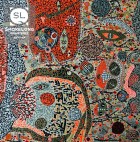When reading your piece, the overall description of cartwheels and nipples juxtaposed with the ongoing description of your professional relationship with the man really added a whole new layer to your story to me. What led you to include this particular image?
It’s a weird image that gives insight to the narrator and her unwillingness to be vulnerable with someone she professionally respects or wants respect from. Too often there are stories about crossing those work-relationship boundaries. I wanted to think about hovering around the boundary, but never crossing for some reason or another.
The characters and emotions in your piece were so palpable and believable I wouldn’t be surprised if you were drawing from your own experiences. What are some things you think about when aiming to make a story more “realistic?”
Good Question. I was totally drawing on experience. A friend of mine was killed by a bear, and while I’m not new to grief, it did throw me off a little. I really had to think about my friendship with him and what that meant. When I’m trying to make a story more realistic, I really stick to the basic senses, like smell or sight, that a character might perceive. And then I try to tie that in with the character’s emotional status. It’s much like real life: If you hear a song from a decade ago, do certain feelings instantly come to the surface?
Loss and grief have a funny way of making us look back at memories with very different dispositions, especially when brought to a physical form such as in prose. How do you steer away from talking about such heavy subjects without romanticizing them? Do you think romanticizing is inseparable from writing?
It is difficult to write about heavy subjects without romanticizing or overdramatizing them. I think my writing style is simple and I leave a lot of room for a reader to interpret emotions. Otherwise, it would be just heavy-handed and would lose its strength. And then you would lose the ability to learn from them. I hope romanticizing is not inseparable from writing.
Our class discussed what makes writing good. I was wondering what qualifies as good literature in your eyes, and do you have different requirements for pieces you write rather than read.
Ooh, good question. Good literature to me is when something sticks with me after I’ve read it—either the world or the voice of the character or even an image. I don’t have different requirements for pieces I write. I’m usually happy if I get something down on paper—good or not.
I’m aware you have been published before and even have a forthcoming novel, Under Nushagak Bluff. Does your writing process differ when you write for yourself versus for when you are writing for an audience?
I found that if I am trying to write for an audience I have a harder time of it. I will start self-editing and worry about what others may think. But if I write for the sake of understanding a problem or to learn something new, then there is so much less angst involved. So ultimately I try to be selfish and write for myself.
“Cartwheel” was chosen by the students of the Amsterdam University College Creating Writing program.



 The SmokeLong Grand Micro Contest (The Mikey) is now an annual competition celebrating and compensating the best micro fiction and nonfiction online.
The SmokeLong Grand Micro Contest (The Mikey) is now an annual competition celebrating and compensating the best micro fiction and nonfiction online.